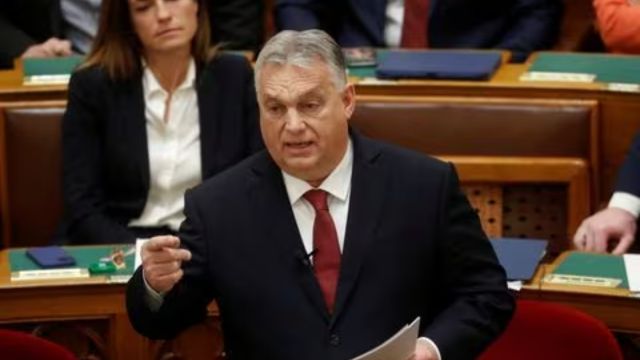EU leaders will meet at a summit on Thursday to decide on further support for Ukraine as the war grinds on. If war-torn Ukraine is going to get anything out of the EU leaders’ summit, it will need the reluctant backing of Hungary’s Prime Minister, Viktor Orban. He has strongly resisted Kyiv’s bid to join the EU and its pleas for aid. Hungary appears on a collision course with fellow European Union members over Ukraine’s bid to join the wealthy bloc, a dispute that could hold up Kyiv’s membership drive and is set to overshadow the EU summit. He has strongly resisted Kyiv’s bid to join the EU and its pleas for aid. “We are the voice of common sense in Europe,” Orban told the Hungarian parliament on the eve of the summit. War, corruption, a big agricultural sector and mistreatment of its Hungarian minority disqualify Kyiv from joining the EU any time soon, he said. A symbolic invitation to Ukraine to start formal negotiations tops the agenda of the two-day meeting in Brussels, alongside a pledge of €54bn (£46bn; $58bn) in EU funds to tide the Ukrainian economy through 2024, and a further €24bn in military support. Hungarian objections threaten to make a bad week even worse for Ukrainian President Volodymyr Zelenskyy. His visit to Washington failed to secure $61bn in US military funding, blocked by Republican lawmakers. “If there is no positive news (in Brussels), this will mean that Putin vetoed this decision,” the Ukrainian leader warned, explicitly accusing Budapest of standing in the way. Budapest could block everything Kyiv is asking for, despite broad support for Ukraine from other EU capitals. Poland’s new Prime Minister, Donald Tusk, warned that “apathy on Ukraine is unacceptable”. The EU’s Commission announced it was unblocking about €10.2bn of more than €30bn of EU funds for Hungary that had been frozen because of backsliding on the rule of law. Although unlocking the funds is widely seen as an attempt to soften Orban’s position, Brussels officials deny they have been blackmailed. And they can point to a law passed the day before in Hungary that reinstates the right of Hungarian judges to turn to the European Court for a preliminary ruling. The change to the criminal code was one of many changes demanded by Brussels. Most other EU leaders stand firmly behind Kyiv. Even Slovakia’s Robert Fico, who has halted military aid to Ukraine, says he will support the start of talks on Kyiv joining the EU. Hours after President Zelenskyy left Washington DC, having failed to unblock US aid, Commission President Ursula von der Leyen told the European Parliament: “We must give Ukraine what it needs to be strong today, so that it can be stronger tomorrow at the table when it is negotiating a long-lasting and just peace for Ukraine.” Zelenskyy desperately needs progress at the EU summit and tried to sound upbeat during a visit to Norway: “We have been very constructive. We have done absolutely everything, we completed the recommendations of the European Union.” The European Commission has suggested that six of the seven preconditions for the start of formal accession talks have now been achieved. That is disputed by Budapest, which accuses Brussels of lowering the bar to help Kyiv. President Zelenskyy was seen locked in intense face-to-face talks with Viktor Orban in Argentina on Sunday – an exchange Ukraine’s president later described as “frank”. To smooth Budapest’s feathers, the Ukrainian parliament passed legislation last week guaranteeing Hungarians and other minorities the right to study in their own language. A new Ukrainian anti-corruption law, required by the EU, was also passed, stripping the Orban government of some of its ammunition. No-one in Brussels suggests that Ukraine is ready to join tomorrow. The start of membership negotiations is a symbolic act of solidarity from the EU 27. Another crack in the Hungarian government’s anti-Ukraine front came on Wednesday when his chief of staff Balazs Orban, who is no relation, said Hungary’s EU funding and Ukraine’s financing were separate issues. “But if the EU insists Ukraine’s financing should come from an amended EU budget, then the two issues become linked,” he told the media. Viktor Orban is adamant that Hungary “cannot be blackmailed” and that financial matters “cannot be muddled with issues of principle”. He, like Volodymyr Zelenskyy, insists he has done everything the Commission has asked him to do - part of the strange symmetry of this summit. But the stakes for Ukraine are far higher. President Zelenskyy risks losing the war with Russia, while Orban wants to win more influence in Europe. His focus is shifting to the European Parliamentary elections in June 2024, when he hopes fellow nationalist parties will triumph. The best outcome for President Zelenskyy would be to return to Kyiv brandishing an invitation to start accession talks and a cheque for €78bn in military and economic aid. For Hungary’s leader, a successful summit would be for the EU and Ukraine to agree a “strategic partnership” – a step on the road to EU accession for Ukraine, but only a small one.
Hungary appears on a collision course with fellow European Union members over Ukraine’s bid to join the wealthy bloc, a dispute that could hold up Kyiv’s membership drive and is set to overshadow the EU summit
Advertisement
End of Article


)

)
)
)
)
)
)
)
)



